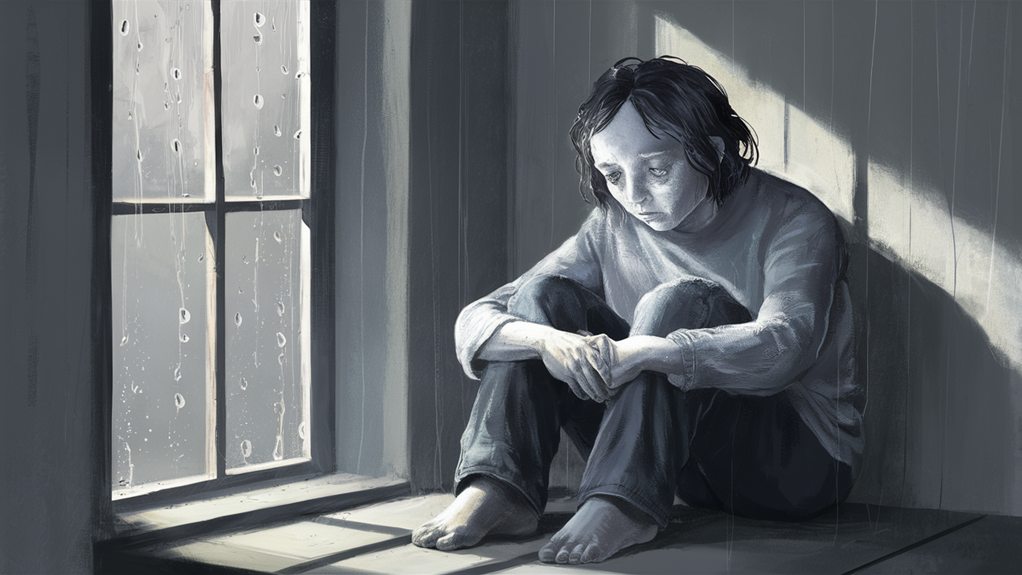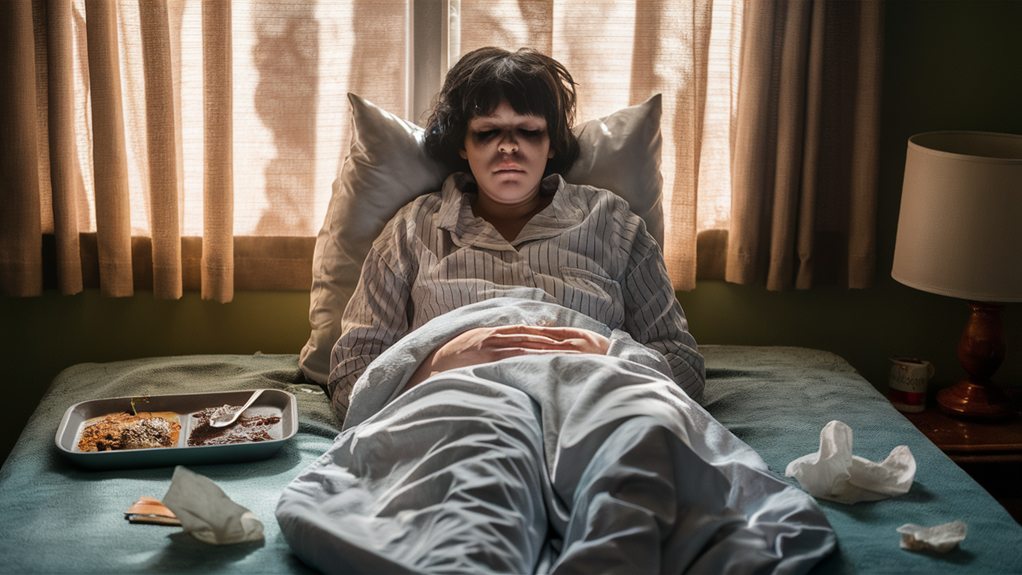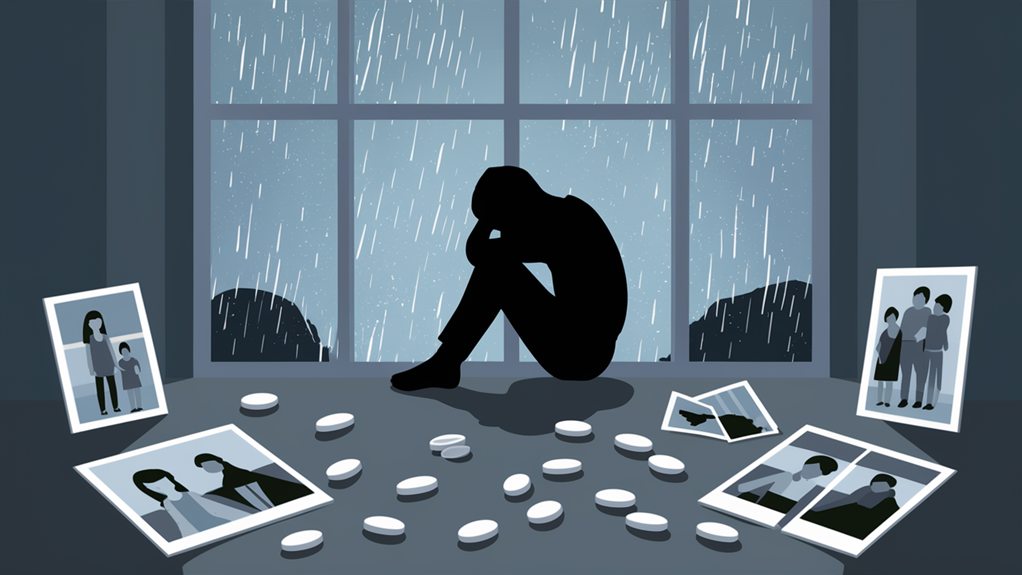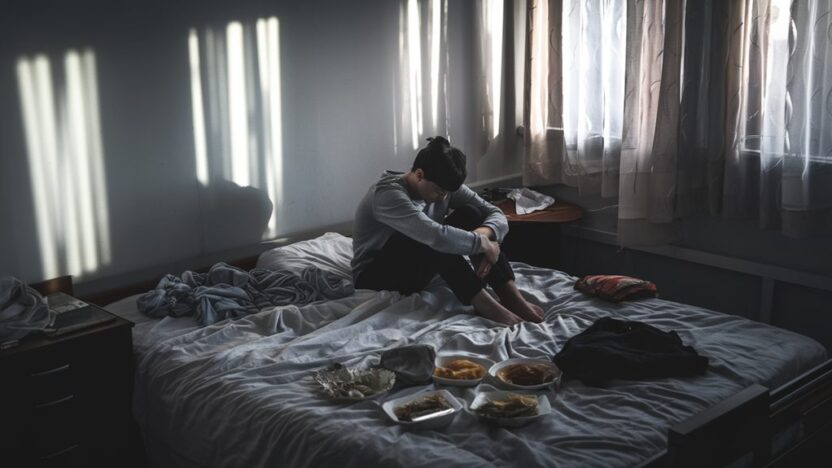Depression symptoms go beyond just feeling sad, and you'll want to watch for several key warning signs. These include persistent feelings of hopelessness, changes in sleep patterns, loss of interest in activities you once enjoyed, and unexplained physical aches. You might notice changes in your appetite, difficulty concentrating, or withdrawal from friends and family. If these symptoms last for more than two weeks and interfere with your daily life, it's important to seek professional help. While depression can feel overwhelming, understanding its signs is your first step toward finding effective support and treatment options.
Understanding Depression Today

Although depression affects millions worldwide, many people still struggle to recognize its signs and understand its true nature. You may have heard various misconceptions about depression, but it's important to know that it's much more than just feeling sad or having a bad day. There are different approaches to therapy, such as CBT techniques, that can help individuals understand and manage their depression.
When you're trying to understand how to recognize depression, remember that it's a complex mental health condition that affects your thoughts, feelings, and daily activities. The early signs of depression can be subtle, showing up in ways you mightn't expect, like changes in your sleeping patterns, loss of interest in activities you once enjoyed, or difficulty concentrating at work or school.
The symptoms of depression can vary from person to person, and they often develop gradually over time. You might notice changes in your appetite, feelings of worthlessness, or unexplained physical aches.
It's essential to understand that depression isn't a sign of weakness or something you can simply "snap out of." Instead, it's a real medical condition that requires proper understanding, support, and often professional help to manage effectively.
Common Emotional Warning Signs
Five key emotional warning signs often signal the onset of depression. You might notice persistent sadness that doesn't lift after a few days, or feelings of hopelessness that make it hard to see any light at the end of the tunnel.
These signs of depression can also include unexplained irritability, where small things that didn't bother you before suddenly feel overwhelming and frustrating. Understanding how these emotional shifts can affect your life is essential, as they often reflect deeper underlying issues related to understanding depression.
Another significant warning sign is the loss of interest in activities you once enjoyed, whether it's your favorite hobby, spending time with friends, or pursuing personal goals. You may find yourself withdrawing from social situations and feeling disconnected from others, even when you're physically present.
Many people also experience feelings of worthlessness or excessive guilt, often blaming themselves for things beyond their control.
If you're noticing these emotional changes lasting for more than two weeks, it's important to recognize them as potential signs of depression rather than temporary mood swings. Your feelings are valid, and identifying these warning signs early can help you take the first step toward getting support.
Physical Symptoms To Watch For

Depression consistently manifests through physical symptoms that can be just as telling as emotional ones.
You'll often notice changes in your sleep patterns, whether you're sleeping too much or battling insomnia. Your eating habits might shift dramatically, leading to unexpected weight loss or gain as your appetite fluctuates. Poor nutrition can exacerbate these symptoms, contributing to cognitive decline and mood disorders, which further complicates the experience of depression the negative effects of poor nutrition.
Your body might feel heavy and sluggish, making even simple tasks feel exhausting. You'll probably experience unexplained aches and pains, including frequent headaches, muscle tension, or digestive problems that don't seem to have a clear cause.
Your movements might become slower, and you'll find yourself speaking more softly or hesitantly than usual.
Watch for changes in your energy levels, as you'll likely feel drained even after a full night's sleep. You might notice that you're moving more slowly, taking longer to complete routine tasks, or struggling to maintain your usual pace.
Physical intimacy might lose its appeal, and you could experience a significant decrease in libido. These physical symptoms aren't just in your head – they're real manifestations of depression that deserve attention and care.
Daily Life Impact Assessment
Understanding how your daily life has changed can reveal depression's true impact. You'll want to examine how your regular routines and activities have shifted, particularly in areas like work, school, or social connections. When you're depressed, simple tasks that once felt effortless, like getting dressed or preparing meals, might now seem overwhelming and exhausting.
Additionally, the interplay between depression and physical health can make these daily challenges even harder to manage, as the link between depression and chronic illnesses may exacerbate your symptoms.
Take note of changes in your social patterns, as depression often leads you to withdraw from friends and family, decline invitations, or avoid social gatherings altogether. Your work or academic performance might suffer too, with missed deadlines, difficulty concentrating, or a noticeable drop in productivity becoming more frequent.
At home, you might notice dishes piling up, laundry remaining undone, or basic household chores being neglected.
Pay attention to your leisure activities as well, since depression typically steals the joy from hobbies you once loved. If you've stopped participating in sports, given up reading, or abandoned creative pursuits, these changes could signal depression's influence on your daily functioning.
Recognizing these impacts is essential for understanding the depth of your symptoms and seeking appropriate help.
Risk Factors and Triggers

Several key factors can heighten your vulnerability to depression, including genetic predisposition, traumatic life events, and certain medical conditions. If your parents or siblings have experienced depression, you're more likely to develop it yourself, though this doesn't mean you'll definitely experience it.
Major life changes, such as losing a job, going through a divorce, or moving to a new city, can trigger depressive episodes when you're feeling particularly vulnerable. Additionally, understanding the difference between stress and anxiety can be essential, as unmanaged stress can lead to increased feelings of anxiety and depression, making it important to address both stress vs. anxiety effectively.
Your physical health plays an essential role too, and conditions like thyroid disorders, chronic pain, or hormonal imbalances can contribute to depression.
Environmental factors, including seasonal changes, isolation, and high-stress environments, might also trigger symptoms. You'll want to pay attention to your lifestyle habits, as poor sleep patterns, lack of exercise, and unhealthy eating can make you more susceptible to depression.
It's important to recognize that substance abuse, including alcohol and recreational drugs, can greatly increase your risk of developing depressive symptoms. Understanding these triggers helps you identify when you're most vulnerable and allows you to take preventive steps or seek help early.
When To Seek Help
Knowing when to reach out for professional help is essential if you're experiencing persistent symptoms of depression. If you've been feeling sad, hopeless, or empty for more than two weeks, it's time to talk to a mental health professional.
Understanding the various mood disorder symptoms can help you identify your feelings and take action. You shouldn't wait until things become overwhelming, as early intervention can make a significant difference in your recovery.
You should definitely seek help if you notice that your symptoms are interfering with your daily life, including work, school, or relationships.
Watch for warning signs like changes in sleep patterns, significant weight changes, or loss of interest in activities you once enjoyed. If you're having thoughts of self-harm or suicide, don't hesitate to call emergency services or a crisis hotline immediately.
Treatment Options Available

Depression treatment generally involves a combination of therapeutic approaches that can be tailored to your specific needs. Your doctor might recommend psychotherapy, also known as talk therapy, where you'll work with a mental health professional to understand your thoughts and develop coping strategies.
Antidepressant medications, which help balance brain chemicals, are another common treatment option that you can discuss with your healthcare provider.
You'll find several other effective treatments available, including cognitive behavioral therapy (CBT), which helps you identify and change negative thought patterns.
Group therapy can connect you with others who understand what you're going through, while mindfulness and meditation practices can help calm your mind and reduce stress.
Some people also benefit from lifestyle changes, such as regular exercise, better sleep habits, and a balanced diet.
Building A Support System
Building a strong support system is essential when you're dealing with depression. You'll want to surround yourself with people who understand, listen without judgment, and offer encouragement during difficult times.
Start by reaching out to trusted family members and friends, letting them know what you're going through and how they can help.
Consider joining support groups, either in-person or online, where you can connect with others who share similar experiences. These groups provide a safe space to express your feelings and learn coping strategies from people who truly understand your struggles.
Don't forget to include mental health professionals in your support network, such as therapists or counselors, who can offer expert guidance and tools for managing depression.
You can also strengthen your support system by participating in community activities, volunteering, or joining clubs that align with your interests.
It's important to remember that you don't have to face depression alone. When you're ready, take small steps to build these connections, and don't hesitate to lean on your support system during challenging times.



